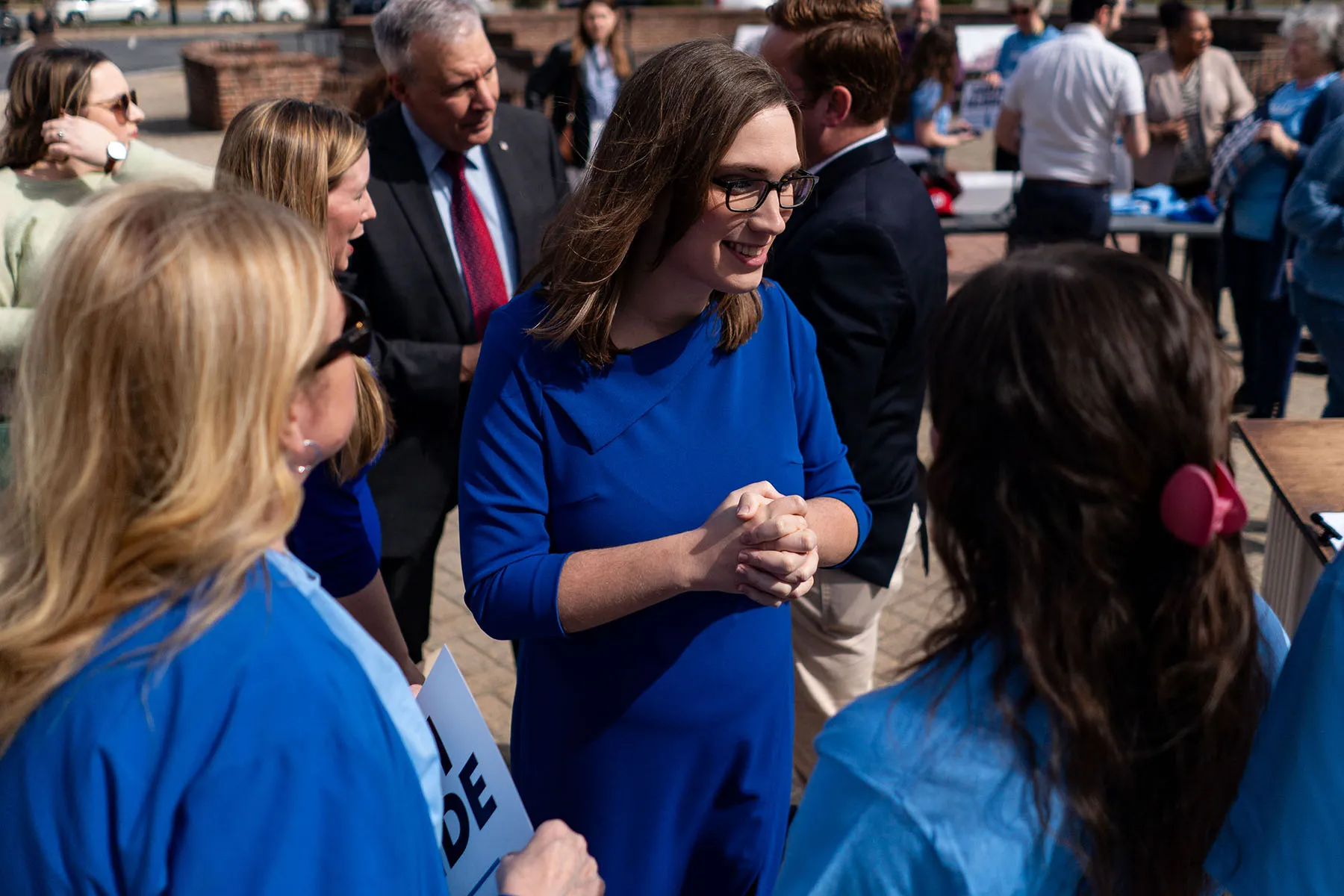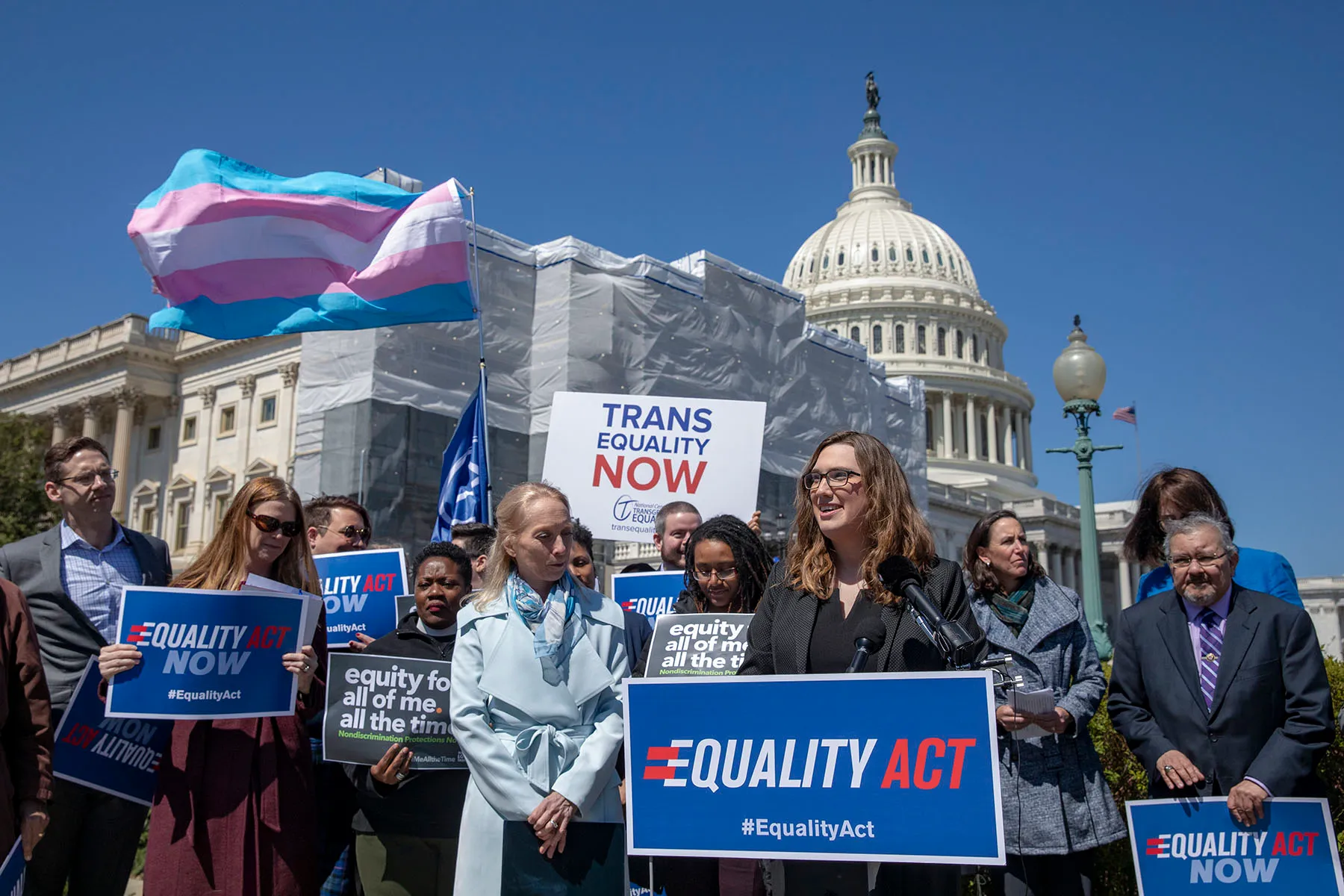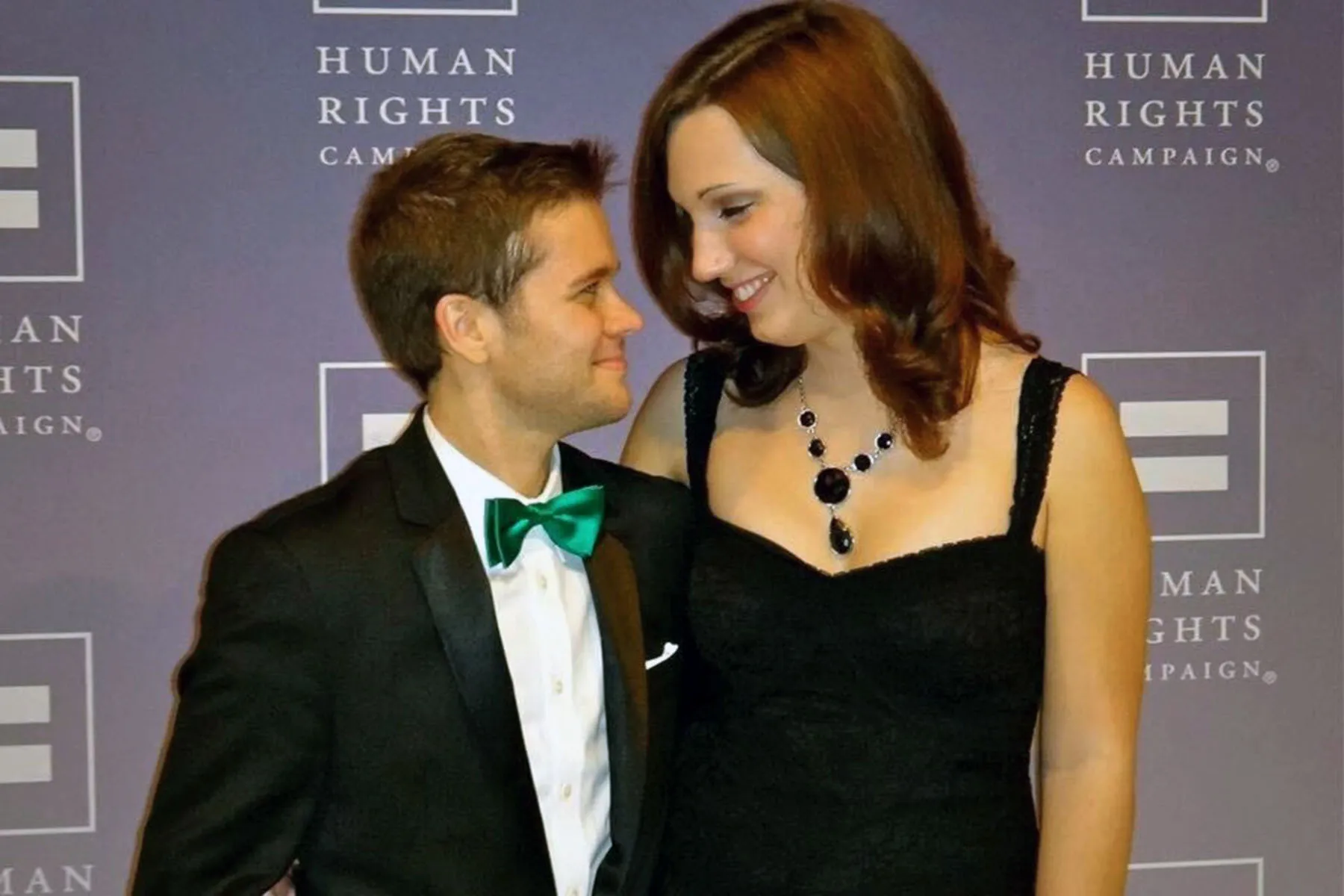We’re going to get you through this election. Sign up for our daily newsletter.
When she was 23, Sarah McBride had to figure out how to suction her boyfriend’s tracheostomy tube. Standing in their apartment bathroom, she held a pile of medical supplies and his life in her hands. She had been awake for nearly 24 hours.
This was Andy Cray’s first night back home after a week-long stay at the hospital and a 12-hour surgery to get many of his lymph nodes removed and half of his tongue replaced to fight the cancer spreading through his body. He had a tracheostomy tube, a feeding tube, bags attached to his neck to drain blood and other fluids, and a large arm wound where tissue had been taken to replace parts of his tongue.
McBride said she had received maybe 15 minutes of training on how to take care of him before they left Johns Hopkins Hospital that October night in 2013. Over the next year, as she took care of the man who would become her husband, her drive to improve Americans’ health care would become a personal mission and define her political life.
McBride saw firsthand the importance of routine health screenings, good insurance and comprehensive home care. She learned how difficult it can be to navigate different hospitals, doctors and specialists to pursue cancer treatment — even for someone like her, who had connections to access the best possible care. And she realized that it takes a village to get through it all.
That night was still early in Cray and McBride’s relationship; they had been dating for a little over a year after first bumping into each other at a White House event in 2012. He was a lawyer, a suave dresser, a policy nerd and her first romance after coming out as a transgender woman. Cray, a trans man several years her senior, was the first person who made her feel genuinely seen as herself.
That night was also the beginning of Cray’s battle with the oral tongue cancer that eventually reached his lungs and took his life on August 28, 2014. Whenever McBride was afraid of losing him and at her wit’s end, he was the one who would calm her down and reassure her that they could handle it, together.
Ten years after his death, Cray has continued to be a singular source of comfort and confidence for McBride, who is poised to become the first out transgender member of Congress, another historic achievement for a millennial state legislator running for Delaware’s sole seat in the U.S. House of Representatives. She thinks about Cray every day on the campaign trail. She’ll be thinking of him on election night, too.
McBride is heavily favored to defeat her Republican opponent, John Whalen, a retired police officer who has staked his run on cutting federal spending and restricting immigration. In a local race, Whalen has made a point to publicly endorse the far-right positions in Project 2025, widely regarded as a policy blueprint for a second Trump administration and assembled by the conservative Heritage Foundation. Project 2025 equates the act of being transgender, or “transgender ideology,” to pornography.
If she enters the House of Representatives, as polls predict she will, McBride knows she will wish that Cray were beside her to help her navigate the challenge of an increasingly chaotic political institution that is home to some of the loudest anti-trans politicians in the country. She knows that some of them will refuse to work with her because of who she is. And she will remember that Cray showed her how to treat people like that with grace.
“In so many ways, if we win on November 5, it will be because of Andy,” she told The 19th in her campaign office in Dover, Delaware. “Both because of the person he helped me become, but more so because of the change he helped bring in the world and the progress he helped deliver in his all-too-short life.”

McBride has described Cray as the biggest influence on her life and political career. Losing him deepened her empathy for others, including those who oppose her basic rights as a trans woman, and brought into stark relief what is really important in life. Through him — and the outsized influence he has had on her approach to LGBTQ+ health policy — she says she learned to create change.
“My four years in the Delaware General Assembly, my focus on health care policy, my focus on paid family and medical leave, they were rooted in the needs that I was hearing from constituents as I was knocking on doors, but they were also rooted in my own experiences with Andy, where I saw, despite the fact that Andy lost his life, just how lucky we were,” she said.
They were lucky because he had health insurance. They were lucky because they both had flexible job schedules. They were lucky because McBride’s older brother, who worked as a radiation oncologist specializing in head and neck cancer at the time, helped guide them.
But being able to get quality health care can’t be a matter of luck, she said.
The Delaware state senator’s accomplishments in office have been a series of legislative love letters to Cray. In 2022, she orchestrated the passage of a statewide paid family and medical leave insurance program, which created a fund for employees to care for family members or themselves while dealing with a serious health condition. In response to a shortage of dentists, she advanced legislation easing the process for out-of-state dentists to become licensed in Delaware. Recently, she introduced legislation — signed into law by the governor this month — that is expected to generate more than $100 million in new Medicaid funding for the state.
As she’s running for Delaware’s at-large House seat, McBride is calling for increased federal investments to support the nursing workforce in the state and federal action to put more spending toward primary care physicians and independent clinics outside of hospitals.
“In doing all of that, we’ll shift our health care system from a sickness system to an actual health and wellness system,” she told supporters and voters at a town hall on October 24. The small event, where McBride spoke alongside Democratic Rep. Kerri Evelyn Harris and Tracey Miller, a Democrat running to represent the state’s 34th District, took place at a community services center for seniors in Dover.
If Cray were still alive, he would be fighting to expand health care access too, McBride told The 19th. And she wouldn’t be surprised if he were to be part of the Biden administration, helping shore up and expand the Affordable Care Act (ACA).
Cray was a driving force behind federal nondiscrimination protections for LGBTQ+ people. He laid the groundwork for the adoption of Section 1557 of the ACA, which prohibits discrimination on the basis of race, color, national origin, sex, age or disability by health programs that receive federal funding. He co-founded Out2Enroll, a service that annually reviews ACA plans for LGBTQ+ inclusion and helps patients find coverage. He was only 28 years old when he died, but his contributions have defined LGBTQ+ Americans’ access to health care for years to come.

Kellan Baker, executive director and chief learning officer of D.C.-based LGBTQ+ health care provider Whitman-Walker, worked closely with Cray in the health policy world for years. Like McBride, he lost someone he loved when Cray died: a friend who dragged him to queer dance parties, introduced him to trashy pop music, watched his cat and joined him for Sunday dinners. He also knows that the country lost a torch-bearer for LGBTQ+ progress.
“He would be helping us figure out what to do with the fact that this field has become so politicized, so mischaracterized and distorted. I know he would be angry if he were still here, and he would also be up to his ears in work,” Baker said. Cray was someone who knew what it was like to need gender-affirming care — and what it was like to fight for it. Because of that, he knew how to translate that personal experience into wide-ranging systemic change for his community, he said.
Baker sees that same talent in McBride.
“She does exactly what Andy did, which was to look at this experience that she had and not think, ‘poor me,’ but to look at this experience that she had, that Andy had, and think, ‘What can I do to make sure this doesn’t happen to other people? What can I do to make other people’s lives better?’ And I’ve seen her carrying that forward,” Baker said.
As a close friend to the couple and someone who also took care of Cray during his cancer treatments, Baker watched McBride support Cray while forging a community around him. He’s seen her take the same approach as a legislator in Delaware, he said — and he hopes that she will be able to take it into Congress to address the issues that she knows so personally.
The polarization that McBride faces is also so much greater than what Cray saw during his lifetime, Baker said. Politicians regularly portray transgender Americans as outsiders and threats to society, to the point where trans people are being used as fodder for attack ads in a presidential campaign. Many trans people fear going to the doctor at a time when their gender-affirming health care is banned in states across the country.
“Here we are, a decade later, in circumstances much more frightening than he or I or anyone could have imagined in 2013 or 2014,” Baker said.
Still, it’s not the prejudice that Cray faced or the anger she felt after his death that has fueled McBride, but an intimate, painful conversation she had with him in the final month of his life. He told her how afraid he was to die. He was sad that he wouldn’t be there with his family, or to keep telling McBride how proud of her he was.
“As tragic as that conversation was, I’m really grateful for it, because it was so vivid,” she said. “And therefore I can still see and hear him say, ‘I’m so proud of you.’”

She has leaned on the memory of these words in moments of fear, during times that require a big decision or as she grapples with how to do things the right way. And the last decade has been consequential for her. In 2021, she was sworn in as the country’s first out transgender state senator. In 2016, she was the first transgender person to speak at the Democratic National Convention. In 2012, the year she met Cray, she was already making history as the first out trans woman to intern at the White House.
She has continued to break barriers, even as she navigates challenging political dynamics and environments in ways that no one else before her has had to. It has required bridging contradictions, meeting people where they are, having difficult conversations and trying to do right by those relying on her. She takes inspiration from Cray, who seemed to have mastered these skills.
Through his love, she said, he’s still guiding her.
To check your voter registration status or to get more information about registering to vote, text 19thnews to 26797.






